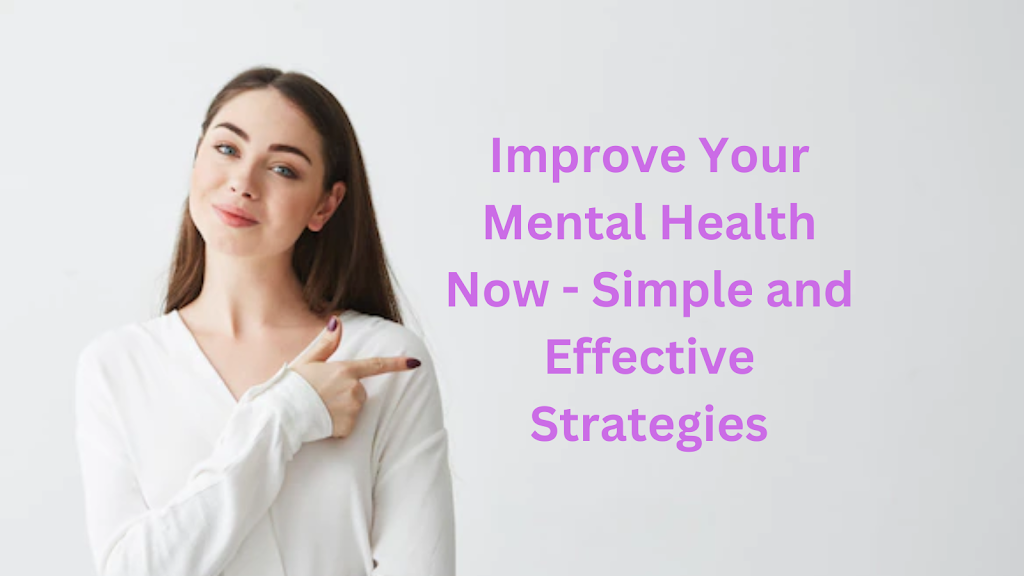Improve Your Mental Health Now – Simple and Effective Strategies
You’re reading this, so you likely already recognize the importance of mental health. You know that when your mental health is good, everything is a little bit easier. But what do you do when it’s not?
Mental health can be unpredictable. One day you might be feeling on top of the world, and the next you might be struggling just to get out of bed. The good news is that there are plenty of things you can do to improve your mental health, regardless of how you’re feeling today.
In this article, we’ll share some simple and effective strategies for improving your mental health. We’ll also explain why it’s important to take care of your mental health and offer some advice for getting started.
Set Realistic and Achievable Goals
One of the simplest ways to improve your mental health is to set goals—and make sure they’re realistic and achievable.
When you set goals that are too lofty or impossible to reach, you’re setting yourself up for disappointment and frustration. This can lead to negative self-talk and a general feeling of dissatisfaction with yourself. On the other hand, when your goals are realistic and achievable, you’ll feel a sense of accomplishment and satisfaction as you work towards them.
 |
| Improve Your Mental Health Now – Simple and Effective Strategies |
This doesn’t mean that you can’t ever dream big, but make sure your dreams are grounded in reality. When it comes to your mental health, it’s always better to err on the side of caution. So start by setting small, manageable goals, and then progress from there.
Exercise Regularly
When it comes to improving your mental health, exercise is one of the simplest and most effective things you can do. In fact, research has shown that exercise is as effective as antidepressant medication in some cases.
And it’s not just aerobic exercise that’s beneficial—strength training has been shown to be helpful as well. The key is to find an activity or activities that you enjoy and can stick with, so you’ll be more likely to make it a regular part of your life.
Practice Relaxation Techniques
You might be thinking, “How can relaxation possibly improve my mental health?” It’s not just about kicking back in your favorite recliner and watching TV (though that can be a great way to relax!), but rather, it’s about creating moments of intentional relaxation. This could mean anything from deep breathing exercises to meditation.
When we let go of the stress and anxiety that our lives come with, we open up a space for healthier thoughts and emotions to shine through. Relaxation techniques help us become more aware of our present state and create a sense of calmness. In turn, this helps us make better decisions, accept things as they are, and have more meaningful relationships both with ourselves and with others.
Having a regular practice of relaxation techniques can make the world of difference when it comes to improving your mental health. So why not give it a try?
Have an Attitude of Gratitude
Research suggests that having an attitude of gratitude can help improve our mental health and make us happier. Why? Because when we take the time to appreciate and be thankful for the good things in our lives, it can boost our mood and self-esteem.
How do you do it? It’s really quite simple: focus on the positive things in your life, even if it’s something as small as a good cup of coffee or a smile from a stranger. Take some time each day to make note of these things, whether it’s in a journal or just mentally. You could also reach out to people who are important to you and let them know how much you appreciate them.
Try this for 21 days and see what happens! You might be surprised at how much better you feel.
Get Enough Sleep
Sleep is one of the most important things you can do for your mental health. It’s essential for our physical and mental wellbeing, yet many of us don’t get enough sleep. In fact, according to the CDC, 1 in 3 adults aren’t getting enough sleep.
So how much sleep do you need? It varies from person to person but on average, adults should aim for 7-9 hours a night. Getting too little sleep can lead to anxiety, depression and even weaken your immune system. To help get more restful sleep try to create a calming nighttime routine such as reading a book or taking a hot bath before bed.
You can also make sure you’re not looking at bright screens before bed and instead opt for calming activities like listening to music or meditating before hitting the hay. Getting enough restful sleep is one of the most important steps you can take towards improving your mental health—so don’t skimp on it!
Conclusion
There is no one-size-fits-all answer to this question, as the strategies that work for one person may not work for another. However, there are a few simple and effective strategies that can help improve mental health in most people.
Some of the most effective strategies for improving mental health include exercise, meditation, and therapy. These strategies can help improve mood, reduce stress, and promote overall mental health.
If you are struggling with mental health issues, it is important to seek help from a professional. There are many effective therapies available, and with the help of a therapist, you can work to resolve your mental health issues and improve your overall quality of life.
